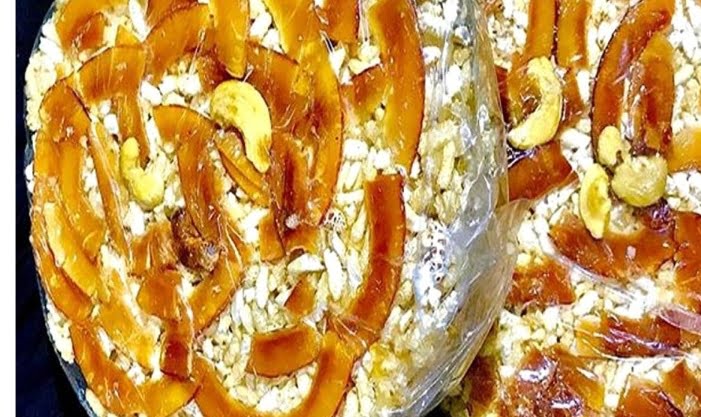Sweet-Makers Jack Up ‘Dhanu Muan’ Price This Year In Odisha’s Berhampur

Berhampur: ‘Dhanu Muan’ (a kind of cake prepared from paddy flakes and sugar or jaggery) flooded Ganjam district on ‘Dhanu Sankranti’ on Tuesday. It will be available till ‘Makar Sankranti’.
More than 150 families in Berhampur have been producing the ‘Dhanu Muan’, which is offered as ‘prasad’ during puja on ‘Dhanu Sankranti’, for centuries. Almost all sweet shops in Ganjam are busy rolling out ‘Dhanu Muan’ of various shapes and sizes which is one of the favourite food items all over Odisha and also outside during the winter season.
Famous as ‘Berhampur Muan’, it is highly sought after in Telangana, Andhra Pradesh, Tamil Nadu and other states.
Though there is no written history about the origin of ‘Dhanu Muan’, historians believe it was prepared in Ganjam district for ritualistic offering to the deity on Dhanu Sankranti. It is a highly favoured prasad of Goddess Maa Tara Tarini.
Originally prepared with jaggery, the sweet-makers of the district were the first ones in Odisha to use sugar to prepare it after the first sugar mill on eastern coast came up at Aska during British rule.
However, the traditional sweet has undergone a change in taste and looks. While jaggery has been replaced with sugar, ghee instead of oil is used to prepare the delicacy. To add to the flavour, coconut chunks, cherries and cashew-nuts are added.
The price of ‘Dhanu Muan’ has also gone up over the years. This year, each piece prepared with ‘desi ghee’ costs Rs 380 to Rs 420 per kg which is Rs 20-30 more than last year. General ‘Dhanu Muan’ is being sold for Rs 120 to Rs 140 per kg, said A Venkataraman Subudhi, a shop-owner at Kamapalli Square.
More than 1000 kg of the sweet dish prepared with ghee is sold in Berhampur per day with Balaji Mistan Bhandar, Mukta Sweets and Sahu Sweets being the most sought after shops in the city, said Subudhi.
On the method of preparation, he said at first, paddy flakes are stirred with ghee and sugar in a gigantic utensil at a high temperature. When the flakes become soft, necessary quantity of it is moulded and pressed into different shapes and coconut chunks fried with ghee are sprinkled on it. The ‘Muan’ remains fit for human consumption upto six months after preparation.

Comments are closed.